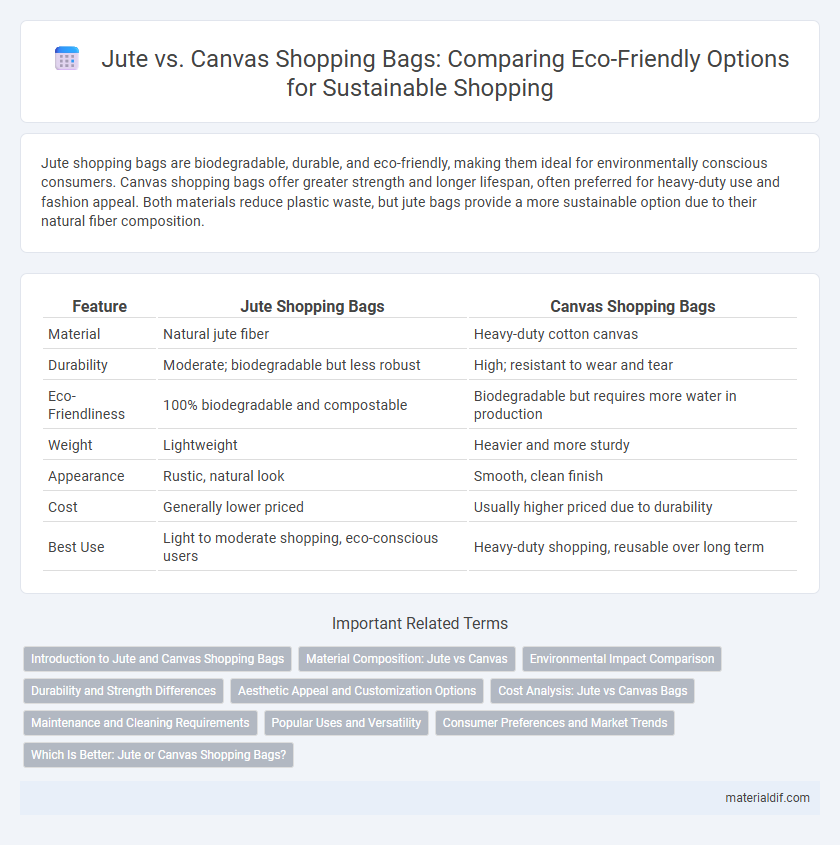Jute shopping bags are biodegradable, durable, and eco-friendly, making them ideal for environmentally conscious consumers. Canvas shopping bags offer greater strength and longer lifespan, often preferred for heavy-duty use and fashion appeal. Both materials reduce plastic waste, but jute bags provide a more sustainable option due to their natural fiber composition.
Table of Comparison
| Feature | Jute Shopping Bags | Canvas Shopping Bags |
|---|---|---|
| Material | Natural jute fiber | Heavy-duty cotton canvas |
| Durability | Moderate; biodegradable but less robust | High; resistant to wear and tear |
| Eco-Friendliness | 100% biodegradable and compostable | Biodegradable but requires more water in production |
| Weight | Lightweight | Heavier and more sturdy |
| Appearance | Rustic, natural look | Smooth, clean finish |
| Cost | Generally lower priced | Usually higher priced due to durability |
| Best Use | Light to moderate shopping, eco-conscious users | Heavy-duty shopping, reusable over long term |
Introduction to Jute and Canvas Shopping Bags
Jute shopping bags, made from natural plant fibers, offer eco-friendly, biodegradable alternatives with strong durability and breathability. Canvas shopping bags, crafted from tightly woven cotton or linen, provide robust strength, reusability, and resistance to wear and tear. Both materials support sustainable shopping practices, with jute emphasizing natural fiber benefits and canvas highlighting heavy-duty performance.
Material Composition: Jute vs Canvas
Jute shopping bags are made from natural plant fibers derived from the jute plant, offering eco-friendly, biodegradable, and compostable properties. Canvas shopping bags, typically crafted from cotton or a cotton-polyester blend, provide a durable, heavy-duty fabric known for its strength and resistance to wear. While jute fibers have a coarser texture and are more biodegradable, canvas materials offer greater flexibility and longer-term reuse potential.
Environmental Impact Comparison
Jute shopping bags have a significantly lower environmental footprint than canvas bags due to their faster biodegradability and renewable plant-based origins, resulting in reduced soil and water pollution during decomposition. The cultivation of jute requires less water and pesticides compared to cotton, which is the primary material for canvas, thereby conserving natural resources and minimizing chemical runoff. Lifecycle analyses show jute bags emit less CO2 and demand less energy during production, making them a more sustainable choice for eco-conscious consumers.
Durability and Strength Differences
Jute shopping bags exhibit high tensile strength and are naturally resistant to wear, making them ideal for carrying heavy grocery items over extended periods. Canvas shopping bags offer superior durability due to their densely woven cotton fibers, which provide enhanced abrasion resistance and structural integrity for repeated use. While jute is more environmentally sustainable, canvas excels in long-term durability and strength, ensuring reliable performance for diverse shopping needs.
Aesthetic Appeal and Customization Options
Jute shopping bags offer a rustic, natural aesthetic with a coarse texture and earthy tones that appeal to eco-conscious consumers seeking authenticity. Canvas shopping bags provide a smoother surface and a variety of color options, allowing for more vibrant and detailed custom prints. Customization on jute is usually limited to simple screen printing, while canvas supports complex designs, embroidery, and multiple printing techniques for enhanced branding flexibility.
Cost Analysis: Jute vs Canvas Bags
Jute shopping bags are generally more cost-effective than canvas bags, with prices typically ranging from $0.50 to $1.50 per bag compared to canvas bags, which can cost between $2.00 and $5.00 per bag depending on quality and design. The lower production cost of jute, derived from its natural fiber abundance and simpler weaving process, makes it an economically favorable option for bulk purchases. However, canvas bags offer greater durability and longevity, possibly justifying their higher initial cost over the long term.
Maintenance and Cleaning Requirements
Jute shopping bags require gentle hand washing with mild detergent to maintain their natural fibers and prevent deterioration, avoiding machine washing to preserve durability. Canvas shopping bags offer more flexibility in cleaning methods, often being machine washable without significant damage, making them easier to maintain over time. Proper drying away from direct sunlight helps both materials retain shape and quality, extending the lifespan of each bag.
Popular Uses and Versatility
Jute shopping bags are highly popular for grocery shopping and eco-friendly promotions due to their biodegradable nature and sturdy texture. Canvas shopping bags offer greater versatility, suitable for fashion accessories, tote bags, and heavy-duty carrying needs because of their durability and customizable designs. Both materials support sustainable lifestyle choices, with jute excelling in natural fiber appeal and canvas providing enhanced strength for repeated use.
Consumer Preferences and Market Trends
Jute shopping bags attract eco-conscious consumers due to their biodegradability and natural fiber appeal, while canvas bags are preferred for durability and reusability. Market trends indicate a rising demand for sustainable materials, with jute gaining popularity in regions prioritizing environmental impact and canvas favored in urban markets emphasizing longevity. Consumer preferences often hinge on balancing environmental benefits of jute with the sturdiness and design versatility of canvas bags.
Which Is Better: Jute or Canvas Shopping Bags?
Jute shopping bags are biodegradable, lightweight, and highly durable, making them an eco-friendly alternative to plastic bags and ideal for everyday use. Canvas shopping bags offer superior strength and longevity, often supporting heavier loads and repeated washing without wear. Choosing between jute or canvas depends on prioritizing natural fiber sustainability versus durability and reusability, with jute excelling in compostability and canvas in lifespan.
Jute Shopping Bags vs Canvas Shopping Bags Infographic

 materialdif.com
materialdif.com